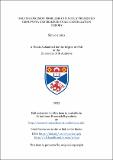Files in this item
Solving decision problems in finitely presented groups via generalized small cancellation theory
Item metadata
| dc.contributor.advisor | Roney-Dougal, Colva Mary | |
| dc.contributor.advisor | Cameron, Peter J. (Peter Jephson) | |
| dc.contributor.author | Jurina, Simon | |
| dc.coverage.spatial | 195 | en_US |
| dc.date.accessioned | 2023-05-10T08:26:42Z | |
| dc.date.available | 2023-05-10T08:26:42Z | |
| dc.date.issued | 2023-06-13 | |
| dc.identifier.uri | https://hdl.handle.net/10023/27549 | |
| dc.description.abstract | This thesis studies two decision problems for finitely presented groups. Using a standard RAM model of computation, in which the basic arithmetical operations on integers are assumed to take constant time, in Part I we develop an algorithm IsConjugate, which on input a (finite) presentation defining a hyperbolic group 𝐺, correctly decides whether 𝑤₁ ϵ 𝑋* and 𝑤₂ ϵ 𝑋* are conjugate in 𝐺, and if so, then for each 𝑖 ϵ {1,2}, returns a cyclically reduced word 𝑟ᵢ that is conjugate in 𝐺 to 𝑤ᵢ, and an 𝑥 ϵ 𝑋* such that r₂= G 𝑥^{-1} r_1 x (hence if 𝑤₁ and 𝑤₂ are already cyclically reduced, then it returns an 𝑥 ϵ 𝑋* such that 𝑤₂=_G x^{-1} w_1 x). Moreover, IsConjugate can be constructed in polynomial-time in the input presentation < 𝑋 | 𝑅 >, and IsConjugate runs in time O((|𝑤₁| + |𝑤₂| min{|𝑤₁|, |𝑤₂|}). IsConjugate has been implemented in the MAGMA software, and our experiments show that the run times agree with the worst-case time complexities. Thus, IsConjugate is the most efficient general practically implementable conjugacy problem solver for hyperbolic groups. It is undecidable in general whether a given finitely presented group is hyperbolic. In Part II of this thesis, we present a polynomial-time procedure VerifyHypVertex which on input a finite presentation for a group G, returns true only if G is hyperbolic. VerifyHypVertex generalizes the methods from [34], and in particular succeeds on all presentations on which the implementation from [34] succeeds, and many additional presentations as well. The algorithms have been implemented in MAGMA, and the experiments show that they return a positive answer on many examples on which other comparable publicly available methods fail, such as KBMAG. | en_US |
| dc.language.iso | en | en_US |
| dc.relation | Solving decision problems in finitely presented groups via generalized small cancellation theory (thesis data) Jurina, S., University of St Andrews, 21 Mar 2023. DOI: https://doi.org/10.17630/0f7a7c71-26f5-4346-9bf1-3da33e354721 | en |
| dc.relation.uri | https://doi.org/10.17630/0f7a7c71-26f5-4346-9bf1-3da33e354721 | |
| dc.subject | Hyperbolic groups | en_US |
| dc.subject | Geometric/Computational group theory | en_US |
| dc.subject | Decision problems | en_US |
| dc.subject | MAGMA | en_US |
| dc.subject | Pregroups | en_US |
| dc.subject | Van Kampen diagrams | en_US |
| dc.subject.lcc | QA171.J88 | |
| dc.subject.lcsh | Hyperbolic groups | en |
| dc.subject.lcsh | Geometric group theory | en |
| dc.subject.lcsh | Statistical decision | en |
| dc.subject.lcsh | Pregroups | en |
| dc.title | Solving decision problems in finitely presented groups via generalized small cancellation theory | en_US |
| dc.type | Thesis | en_US |
| dc.contributor.sponsor | Engineering and Physical Sciences Research Council (EPSRC) | en_US |
| dc.contributor.sponsor | University of St Andrews. School of Mathematics and Statistics | en_US |
| dc.type.qualificationlevel | Doctoral | en_US |
| dc.type.qualificationname | PhD Doctor of Philosophy | en_US |
| dc.publisher.institution | The University of St Andrews | en_US |
| dc.identifier.doi | https://doi.org/10.17630/sta/429 | |
| dc.identifier.grantnumber | EP/R513337/1 | en_US |
This item appears in the following Collection(s)
Items in the St Andrews Research Repository are protected by copyright, with all rights reserved, unless otherwise indicated.

